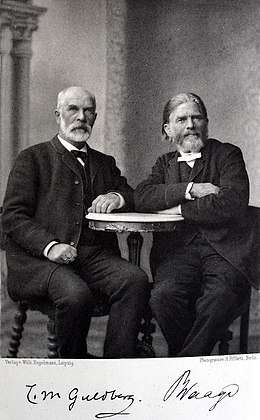Peter Waage
Peter Waage (29 June 1833 – 13 January 1900) was a Norwegian chemist and professor. He was a professor of chemistry at the University of Kristiania. Along with his brother-in-law Cato Maximilian Guldberg, he co-discovered and developed the law of mass action between 1864 and 1879.[1] [2]
Peter Waage | |
|---|---|
.jpg) Peter Waage | |
| Born | 29 June 1833 Flekkefjord, Norway |
| Died | 13 January 1900 (aged 66) Kristiania (now Oslo), Norway |
| Nationality | Norwegian |
| Alma mater | Royal Frederick University (now University of Oslo) |
| Known for | law of mass action |
| Awards | Order of St Olav Knight (1882) Commander (1894) |
| Scientific career | |
| Fields | chemistry |
| Institutions | Royal Frederick University (now University of Oslo) |

Biography
He grew up on the island of Hidra in Vest-Agder, Norway. He was the son of Peder Pedersen Waage (1796–1872) and Regine Lovise Wathne (1802–72). He attended the Bergen Cathedral School and studied chemistry and mineralogy at the University of Kristiania (now University of Oslo) under Adolph Strecker. In 1858, he received the Crown Prince's gold medal (Kronprinsens gullmedalje) for work on the development of the Theory's acidic acid radicals. He became a cand.real. in 1859. He subsequently traveled to France and Germany, where he studied for two years including time spent with Robert Bunsen in Heidelberg. [3] [4]
In 1861, Waage was made an associate professor and in 1866 he was appointed professor of chemistry at the University of Kristiania. He remained a professor at the University over 30 years. He was also chairman of the Norwegian Polytechnic Society from 1868 to 1869, and the first chairman of the Norwegian branch of the YMCA when it was established in 1880.[4] [5]
Personal life
He was married twice. In 1862, he married Johanne Christiane Tandberg Riddervold (1838- 1869), daughter of Hans Riddervold (1795-1876) and Anne Marie Bull (1804-70). Following the death of his first wife, he was married in 1870 with Mathilde Sofie Guldberg (1845-1907), sister of Cato Guldberg. [6]
References
- Asimov, Asimov's Biographical Encyclopedia of Science and Technology 2nd Revised edition
- "Peter Waage". University of Bergen. Retrieved February 1, 2018.
- "Stud. med. Peter Waage". University of Oslo. Retrieved February 1, 2018.
- Bjørn Pedersen (2017-09-14). "Peter Waage". Store norske leksikon. Retrieved February 1, 2018.
- "Peter Waage & Cato Guldberg". Luminescent. Retrieved February 1, 2018.
- Ove Kjølberg. "Peter Waage". Norsk biografisk leksikon. Retrieved January 1, 2017.
Other sources
- Bjørn Pedersen (2007) Peter Waage kjemiprofessoren fra Hidra(University of Oslo School Laboratory - Chemistry) ISBN 978-82-91183-07-7
Publications
- Waage, P.; C. M. Guldberg (1864). "Studies Concerning Affinity". Forhandlinger: Videnskabs - Selskabet I Christinia: 35.
- Abrash, Henry I.; Gulberg, C. M. (1986). "Studies Concerning Affinity". Journal of Chemical Education. 63 (12): 1044–1047. Bibcode:1986JChEd..63.1044W. doi:10.1021/ed063p1044.- English translation of Waage and Guldberg's 1864 paper (above)
Related reading
- Peter Østrøm Guldberg and Waage on the Influence of Temperature on the Rates of Chemical Reactions (Centaurus. Volume 28, Issue 3. Pages 277–287. October 1985)
- Robin E. Ferner and Jeffrey K. Aronson Cato Guldberg and Peter Waage, the history of the Law of Mass Action, and its relevance to clinical pharmacology (Br J Clin Pharmacol. 2016 Jan; 81(1): 52–55)
| Preceded by Cato Maximilian Guldberg |
Chairman of the Norwegian Polytechnic Society 1868–1869 |
Succeeded by Cato Maximilian Guldberg |